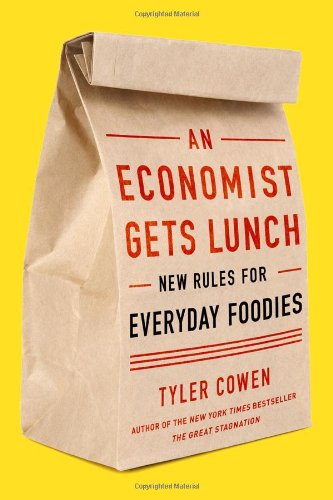An Economist Gets Lunch
by Tyler Cowen
Penguin Books, 2012, 293 pages
 Have you ever not ordered something at a restaurant because it had strange ingredients, and ordered the roast chicken instead? Ever tried a restaurant because the social vibe of the place made you think it would be a great night out?
Have you ever not ordered something at a restaurant because it had strange ingredients, and ordered the roast chicken instead? Ever tried a restaurant because the social vibe of the place made you think it would be a great night out?
They're safe bets. You know roast chicken, because you've had it before. You think that because those people are enjoying themselves, so will you. Wrong.
At least according to Tyler Cowen, the author of Discovering Your Inner Economist and creator of the great economics blog MarginalRevolution.com.
Cowen wants to help start the next food revolution by turning consumers into innovators, which can be achieved by everyone following his one rule: "Food is a product of supply and demand, so try to figure out where the supplies are fresh, the suppliers are creative and the demanders are informed."
The book itself has two distinct personalities ― the first is an economical guide to improving your experience with food, both at home and in restaurants. The second is Cowen's more serious views on the declining levels of innovation towards food globally, and how it can be remedied.
When Cowen is focused on the former, the book is enjoyable and an absolute page-turner, full of insightful tips and clever analysis. For example, Cowen advises that when choosing a restaurant to eat at you should try looking for a place that pays low rent on the land. These places aren't slaves to sales, and can afford the risk of experimenting with dishes to improve them that high rent restaurants cannot. Note the clientele ― if they are young and good looking, the restaurant makes money from the social atmosphere and people ordering drinks, so they probably don't have to focus on great food.
 When seated, don't order the standard, reliable dishes ― your roast chickens, spaghetti bologneseses and so on ― because the restaurant doesn't need to deliver greatness on those to make money from it, only to serve it. Look further down the list ― what seems strange and unusual? Order it. They have to excel at that dish, otherwise they would never sell it. That's just some of the many tips you can use immediately, and that alone makes the book worth reading.
When seated, don't order the standard, reliable dishes ― your roast chickens, spaghetti bologneseses and so on ― because the restaurant doesn't need to deliver greatness on those to make money from it, only to serve it. Look further down the list ― what seems strange and unusual? Order it. They have to excel at that dish, otherwise they would never sell it. That's just some of the many tips you can use immediately, and that alone makes the book worth reading.
When Cowen turns to the state of food internationally the book isn't as strong, but it's still interesting. Cowen believes that the innovation of food is not just held back by us consumers, but many other factors across the globe, including government intervention.
For example, government subsidies for corn in America have led to an abundance of corn syrup on the market, and less land for other products to be grown. Food innovation in America is shackled by this as a result, and America is stuck with the bland and tasteless corn-based products. Similarly, genetically modified crops are heavily regulated across the world, preventing experiments which could improve the lives of hundreds of millions around the world. The less government intervention, the better off food is.
Another highlight of the book is Cowen's criticism of the green movement (political greens, he's pro-vegetables). Cowen exposes many myths about the green view of food, and not just on genetically modified food. From the debate over locally-grown food versus imported produce to the "evils" of large agribusiness, greenies are shown to be wrong and wrong again. Cowen slams environmentalists for only doing things that appear to "save the planet", rather than doing what will actually help the planet and humans as well.
But the book is not flawless. Cowen clearly writes for an American audience with a chapter on how American food got so bad, and another on where the best American steakhouses are. Some of this can still be interesting for an Australian audience though, as he does expand these chapters into the realms of government intervention, ethnic foods and supermarket shopping.
But just because Cowen is generally against government intervention does not mean my readers would enjoy every aspect of this book. This is evident in the chapter "Eating Your Way To A Greener Planet". Though his critique of environmentalists is refreshing, he is still concerned about how to tackle man-made global warming and limiting our "carbon footprint". Most annoyingly of all, he spends many pages of the book making the case for a carbon tax, which detracts from his otherwise excellent advice for food-buyers and policymakers alike.
No comments:
Post a Comment